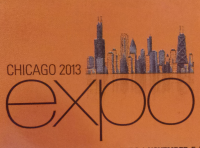Day 1 of the FIA Chicago Expo is complete. I’ll recount what I can remember of it!
OPENING SESSION: GENSLER
I came in mid-way through Chairman Gensler’s speech in the morning (had to check my coat, get a coffee, and ran into some folks en route). I’ve seen the Chairman speak before and I’m not sure if the story changes:
- CFTC doesn’t have a lot of people so we can’t do everything we’d like to do
- CFTC is promoting integrity in the market
- We’re better off / better equipped now than we were during the financial crisis
I admire him for his calm demeanor and thoughtful and sincere approach to everything he does. At the same time I feel sorry for him; I do believe he is doing the best he can, but he’s got a measly 200mm USD budget and is trying to oversee a bunch of arrogant, highly sophisticated, politically minded and savvy businessmen who are employed to innovate around any hurdles in their path. No easy task.
Then the Q&A. The one question I recall was from a commodity professional who posed the question that if the crisis was born out of a collapse in the mortgage markets, why does the CFTC feel the need to further regulate the commodity market, which (he claimed) performed well during the crisis.
I’ve heard the same question asked with “commodity” replaced with “FX”. Once again I feel compassion. You have to realize there are dozens of local, small FCMs and CTA’s that are being murdered by regulation. Firms that don’t readily even have the voice to respond to regulations during the comment periods, let alone the staff to build technology to support them and operationally change. Gensler’s response was that the crisis was an asset bubble, not explicitly a mortgage bubble, and their focus is on market integrity. Hard not to feel compassion for both parties here.
OPENING PANEL: CCP HEAD HONCHOS
Joe Gawronski, COO of Rosenblatt Securities, and Richard Repetto of Sandler O’Neill moderated a panel consisting of:
This is an annual event and one of the highlights. I am always impressed by their collective ease and humor on stage. Jeff in particular always impresses me. He can make you agree with him on anything. He does this by telling a story with some immutable truth and relating that to the question at hand. By the end of the story, you’ve acknowledged this immutable truth, and through analogy, confirmed for yourself that everything he is saying is also immutably true. Quite a talent.
One of this years analogies he waxed on was in response to a question I honestly cant even remember. One of the moderators must have asked about the strain of regulation on CCPs. Jeff gave us all a history lesson of the Romans commencing trade in a gravel lot thousands of years ago, and Wall Street forming out of commerce being conducted under a buttonwood tree in Manhattan. He postulated that there must have been flatter gravel lots with more shade, and larger buttonwood trees that would serve the market better; but the only true importance was the natural network that was formed by these markets. By the end of his story, I was ready to write my congressman to give Jeff a break.
His demeanor is impressive, and was quick to put the criticism back on the industry. He suggested instead of waiting for rules and regulations to be written, discussed, commented on, lobbied, etc, etc, firms such as his and industry organizations such as the FIA should self-regulate and self-promote some of these ideals and best practices so that when government regulatory agencies start attempts to police, the industry can point to the efforts already underway. “We should stop lobbying Washington and just get on with it” was his quote, if I remember correctly. Inspirational.
Gill is also very clever. The moderators mentioned the upcoming ICE/NYSE merger and asked whether CCP consolidation was going to continue (if there is anyone left!). Gill relayed a story how the CME and Deutsche Borse had once had some initial merger discussions, so Andreas came to Chicago for a visit. Gill recalled “I told Andreas I would pick him up from the airport. But I got the date wrong”. So much for that potential merger.
Andreas clearly got the wrong end of the stick with his attempted NYSE merger, and he described how painfully close he got. There also seemed to be common agreement that the European regulation timeline lagging the US timeline has put him at a disadvantage versus his American competitors. I wasn’t aware but it seems Eurex has had for MANY YEARS an application in with the CFTC to start operations within America (I am aware of their pending DCO application but he was referring to something else). Seems he is getting the short end of the stick in America. Perhaps he could use some of Jeff’s power of persuasion.
That didn’t stop him from his self-proclaimed infomercial – Full client segregation, and full margin offsets across asset classes.
HFT was raised as a topic and unanimously dismissed as not a problem to be regulated, and in fact given the safeguards in place, is essential to market liquidity.
Panel closed with a quick poll on where volumes will go. Once again unanimous agreement. Gill has faith that as rates pick up, volatility and speculation will drive increase in business. Andreas pointed to growth in Asia. Jeff gave another one of his immutable truths, which I will attempt to paraphrase: If a hurricane hit your vacation house, would you spend as much time there? Of course not. You’d slowly fix it up and when you move back in you’d buy hurricane insurance. Of course. Hence volumes will pick up. Just nod your head in agreement.
DOWN TIME
The FIA exhibit hall is expansive. I managed to cover about ½ of one room in the couple hours before lunch. The Chicago Expo is very well done, and very well attended.
PULITZER PRIZE WINNER
George Will spoke at lunch and held the ballroom at full attention for a good 30 minutes. George is well known for his conservative views and he certainly didn’t stray from course. His gave multiple history lessons, focusing on the dangers of excessive government. I could imagine some of the foreign nationals in the room walking out thinking its all doom and gloom here in America.
Given my political views are largely aligned with his, I was intrigued with his story telling. He began by discussing how legislation such as Social Security (1935) and Medicare (1965) are simply written in a different era and cannot possibly be relevant today, given both the life expectancy and retirement age in 1935 were 65 years of age. Today, the life expectancy has of course jumped, but the retirement age has not kept up. he quantified this gap, if I recall its a 100,000 USD revenue vs a 300,000 USD liability, per person.
On health care, he made the analogy of washing a rental car to looking after one’s own health. He asked if anyone ever asked a doctor what a procedure will cost (one person in maybe 400 raised their hand). Large government making you more reliant.
He successfully painted the picture that as government has grown and more people are reliant upon it, that we are approaching a tipping point from where there will be no return.
Some people left depressed. I left inspired to get him into office!
MORE DOWN TIME
The sessions at Expo are too numerous and overlapping. I found myself attending a couple SEF showcases and networking, only to run into a panel hosted by John Needham at the very end. I did however manage to catch the start of a session on the cost of clearing in the new world.
COST OF CLEARING
David Olson of JPM chaired a panel consisting of:
- Sunil Cutinho, CME
- Jerome Kemp, Citigroup
- Michael Yarian, Barclays
- Steve Mahoney, Credit Suisse
Good panel, at least I learned something. There was general agreement that clearing is no longer a capital efficient process. I had heard this before but hadn’t heard this quantified.
David gave an example of 1 trade, a 100mm, 30 year swap with a 10mm (10%) up front initial margin. Simplifying the numbers, one could expect an additional guarantee fund requirement of 1mm. With a 100% RWA on guarantee fund contributions, he approximated a required return on capital of 15,000 USD for this single trade. Jerome in particular validated that only the very efficient FCM’s will survive under the current regime.
Sunil was asked about rule 39.33. I had heard of the issue, but never by number before, which pertains to a proposed liquidity profile of 0 for US treasuries, which would require significantly more cash to be pledged to the CCP. Sunil argued that there is such tremendous liquidity in US Treasuries that even under absurd strains on liquidity (such as when CME would require it), the market has shown that there is still 100x the required liquidity that CME would require.
Sunil was handed a layup when David asked how CME will help clients. Sunil responded that while 2013 was the year of clients dealing with compliance, 2014 will be the year that clients focus on cost. Hence the CME is offering tools and services such as a larger collateral acceptance program as well as portfolio margining to help in this cause.
I had to run out a bit early to give a demonstration (I do have to run a business here!).
NIGHT LIFE
As has become custom, the annual CME reception was very well attended at Union Station. They know how to throw a party. I stayed for an hour and got on my train so I can do it all again tomorrow.
FIA Chicago Expo BLOG SERIES:
Day 0: https://www.clarusft.com/fia-chicago-expo-day-0/

